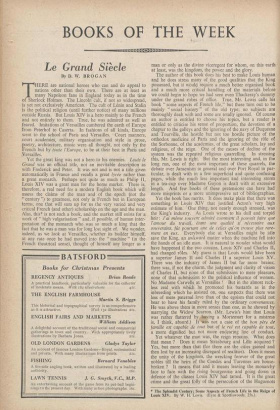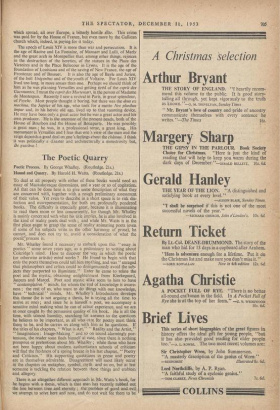BOOKS OF THE WEEK
Le Grand Siecle
By D. W. BROGAN THERE are national heroes who can and do appeal to nations other than their own. There are at least as many Napoleon fans in England today as in the time of Sherlock Holmes. The Lincoln cult, if not so widespread, is yet not exclusively American. The cult of Lenin and Stalin is the political religion (until further notice) of many millions outside Russia. But Louis XIV is a hero mainly to the French land not entirely to them. True, he was admired as well as feared. Imitations of Versailles cumbered the earth of Europe from Peterhof to Caserta. In fashions of all kinds, Europe went to the school of Paris and Versailles. Court manners, court academies, military organisation and style in prose, poetry, architecture, music were all thought, not only by the French but by toute l'Europe, to be at their best in Paris and Versailles.
Yet the great king was not a hero to his enemies. Louis le Grand was an official title, not an inevitable description as with Frederick and Peter. It was not and is not a title given automatically in France and recalls a great lycee rather than a great monarch. Perhaps not quite as much as Philip II, Louis XIV was a great man for the home market. There is, therefore, a real need for a modern English book which will assess the claims of the man and of the epoch (not the " century ") to greatness, not only in French but in European terms, one that will sum up for us the very varied and very critical French (and other) scholarship on the age and the man. Alas, this* is not such a book, and the market still exists for a work of " high vulgarisation " and, if possible, of human inter-' pretation of the monarch who was so much a king that the fact that he was a man was for long lost sight of. We wonder, indeed, as we look at Versailles, whether its builder himself, at any rate once he had moved into the " machine " (in the French theatrical sense), thought of himself any longer as .a man or only as the divine viceregent for'whom, on this earth at least, was the kingdom, the power and the glory. The author of this book does his best to make Louis human and he does stress many of the good qualities that the King possessed, but it would require a much better organised book and a much more critical handling of the materials before we could begin to hope we had seen even Thackeray's dummy under the grand robes of office. True, Mr. Lewis calls his book " some aspects of French life," but these turn out to be mainly " social history " of the old type; no subjects are thoroughly dealt with and some are totally ignored. Of course an author is entitled to choose his- topics, but a reader is entitled to criticise his sense of proportion, the devotion of a chapter to the galleys and the ignoring of the, avy of Duquesne and Tourville, the hostile but not too hostile picture of the orthodox medicine of Paris and the ignoring of the role of the Sorbonne, of the academies, of the great scholars, lay and religious, of the reign. One of the causes of decline of the system was the repeated religious quarrelling. In stressing this, Mr. Lewis is right. But the most interesting and, in the long run, one of the most important of these quarrels, the debate over Jansenism in general and over Port Royal in par- ticular, is dealt with in a few superficial and quite confusing pages, while the much less important and interesting storm in a tea-cup over Madame Guyon is dealt with at excessive length. And few books of these pretensions can have had more misprints or a more unimpressive set of bibliographies. Yet the book has merits. It does make plain that there was something in Lc\uis XIV that justified Acton's very high estimate of him. One thing, not nearly enough stressed, was the King's industry. As Louis wrote to his dull and torpid heir : J'ai ',term souvent adnzire comment it pouvait faire que Famour du travail, etant une qualite si necessaire aux souverains, flit pourtant une de celles qu'on trouve plus rare- ment en eux. Everybody else at Versailles might be idle save the King, an awkward matter when the machine fell into the hands of an idle man. It is natural to wonder what would have happened if the two cousins, Louis XIV and Charles II, had changed roles. My guess is that Louis would have been a superior James II and Charles II a superior Louis XV. There was the industry of James II but far more brains; there was, if not the charm, the judgment and clarity of vision of Charles II, but none of that submission to mere pleasure, none of that submission to the political influence of women. No ,Madame Carwells at Versailles ! But in the almost reck- less zeal with which he promoted his bastards as in the inbreeding which he insisted on, one suspects that there was less of mere paternal love than of the egoism that could not bear to have his family ruled by the ordinary convenances. He was above them in more senses than one, as he showed by marrying the Widow Scarron. (Mr. Lewis's hint that Louis was rather flattered by having a Mortemart for a mistress is, I think, absurd.) It was not a case of the bon pore de famille est capable de tout but of le roi est capable de tout, a More dignified but not more endearing line of conduct. Yet whatever the man was, the reign remains. What does that mean ? Does it mean Strasbourg and Lille acquired 7 Yes, but more than that (for there are the cities gained and then lost by an increasing disregard of realities). Does it mean the unity of the kingdom, the wrecking forever of the great nobles till the heirs of the Condos and Turennes are house- broken ? It menns that and it means leaving the monarchy face to face with the rising bourgeoisie and going down in defence of the classes Louis XIV had tamed. It is the great crime and the great folly of the persecution of the Huguenots * The Splendid Century: Some 'Aspects of French Life in the Reign of Louis XIV. By W. H. Lewis. (Eyre & Spottiswoode. 25s.). was paid for by the House of France, but even more by the Gallican church which, indeed, is paying for it today.
The epoch of Louis XIV is more than war and persecution. It is the age of Racine and La Fontaine, of Mansart and Lulli, of Manly and the great arch in Montpellier that, among other things, rejoices in the destruction of the heretics, of the statues in the Place des Victoires and in the Place Bellecour in Lyons. It is the age of the foundation of Louisiana and of the saving of New France, the age of Frontenac and of Bossuet. It is also the age of Bayle and Jurieu, of the bull Unigenitus and of the youth of Voltaire. For Louis XIV lived too long, in more senses than one. Perhaps we should think of him as he was planning Versailles and getting tired of the esprit des Cuermantes, I mean the esprit des Mortemart, in the person of Madame de Montespan. Recently I saw a revival in Paris, in great splendour, of Psyche. Most people thought it boring, but there was the deus ex nrachina, the Jupiter of his age, who took for a motto Nec pluribus inrpar and, in his heroic old age, lived up to that vaunting device. lie may have been only a great actor but he was a great actor and his own producer. He is the ancestor of the present heads, both of the House of Bourbon and the House of Bonaparte. He was possibly a great man ; he was, in a professional sense, a great king. His monument is Versailles and I fear that one's view of the man and the reign depends a good deal on one's feelings about the chateau. 1 think it was politically a disaster and architecturally a monstrosity but, De gustibus ! which spread, all over Europe, a bitterly hostile elite. This crime



































 Previous page
Previous page